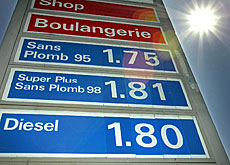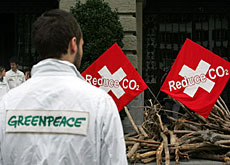New petrol levy is put to the test

A climate levy of 1.5 centimes per litre of petrol or diesel has come into effect in Switzerland. The controversial measure aims to reduce carbon-dioxide emissions.
Environmental organisations are critical of what they call this “pseudo alternative”, which they say only benefits the oil and gas industry.
The so-called climate centime is expected to generate SFr100 million per year. The levy has been set at 1.5 centimes, but will later vary between 1.3 and 1.9 centimes.
The scheme will run for a trial period from now until 2007. If it fails to achieve its objectives by then, it may be replaced with a direct tax on CO2.
The revenue raised will be managed by a foundation made up of representatives from industry, an association of oil and gas companies, the Swiss Business Federation (economiesuisse) and the Touring Club of Switzerland.
This new entity has the goal of reducing harmful CO2 emissions by 1.8 million tons per year between 2008 and 2012.
The new levy has not yet had an effect on prices at the pump, swissinfo found.
The manager of a petrol station on the outskirts of the Swiss capital, Bern, confirmed on Saturday that prices had not yet gone up. At his four pumps business was as good as usual.
Kyoto protocol
The goal of reducing emissions is enshrined in a convention signed last August by the environment ministry.
The foundation will be able to obtain emission-reduction certificates abroad up to a maximum of 1.6 million tons per year, in line with the Kyoto Protocol. The Swiss parliament approved Kyoto with a large majority in 2003.
Most of the real reductions will be made abroad, a much cheaper solution for Switzerland. However, the foundation will also finance energy-saving projects at home to reduce emissions by at least 0.2 million tons per year domestically.
The foundation will be closely watched by the alliance for responsible climate politics, a grouping of about 50 environmental and other organisations. The alliance has been against this voluntary levy by the petrol industry from the beginning.
The alliance claims that it is a “pseudo alternative” to the CO2 tax, tailored to suit business groups and those who profit from petrol.
In a statement, Greenpeace, one of the members of the alliance, characterised the climate levy as a purely cosmetic way of respecting reductions without going to the roots of the problem of the consumption of fossil fuels.
But Rolf Hartl, director of the Swiss Oil Association in Zurich, is convinced that the voluntary climate levy is the best solution to lower CO2 emissions.
“[Introducing a CO2 tax] would lead to far fewer people filling their tanks in Switzerland, particularly foreigners driving through the country and those living in border regions.”
swissinfo with agencies
By 2010, Switzerland has pledged to reduce CO2 emissions from fossil fuels to 10 per cent below 1990 levels.
Additionally, between 2008 and 2012 CO2 emissions must be reduced by 1.8 million tons a year.
This is required by the Kyoto Protocol, which was ratified by Switzerland in 2003.
The climate centime is a voluntary levy on petrol and diesel imposed by industry. The state has no influence on the level or increase of prices, or on the use of revenues.
Green groups want a direct tax on CO2, which would be a national surcharge per ton of CO2 produced. It would be applied to fossil fuels such as heating oil.
To meet Kyoto targets, countries which don’t manage to reduce their CO2 emissions sufficiently can buy emission certificates on a world market set up for this purpose. These effectively give them a “right to pollute”. Sellers are countries that have exceeded their reduction targets.

In compliance with the JTI standards
More: SWI swissinfo.ch certified by the Journalism Trust Initiative











You can find an overview of ongoing debates with our journalists here . Please join us!
If you want to start a conversation about a topic raised in this article or want to report factual errors, email us at english@swissinfo.ch.